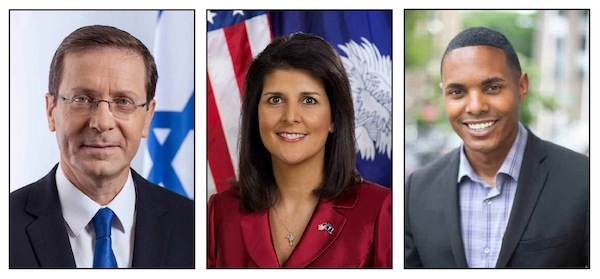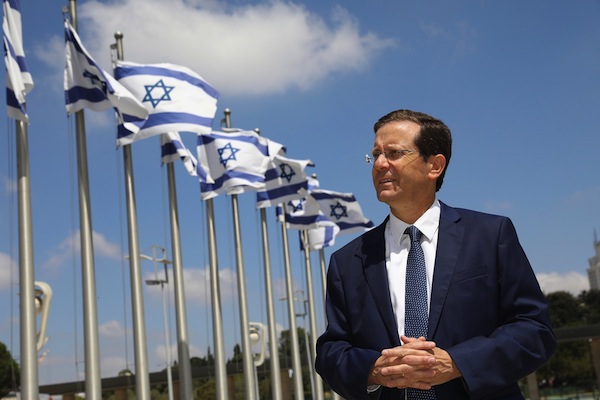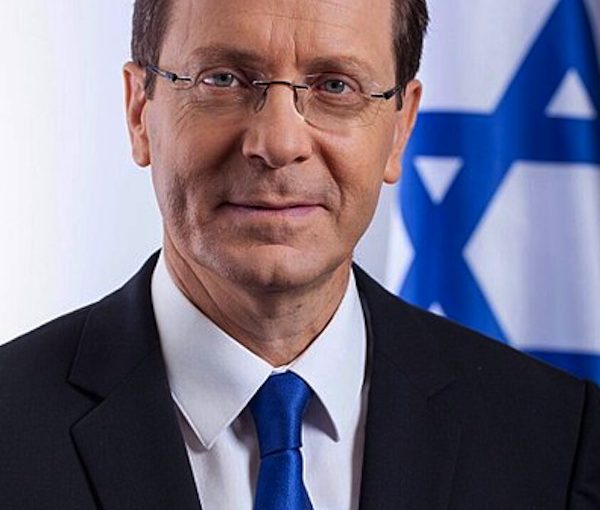Israeli President Isaac Herzog, left, former U.S. ambassador to the United Nations Nikki Haley and U.S. Congressman Ritchie Torres all spoke on Sunday at the General Assembly of the Jewish Federations of North America. (PR photos)
Antisemitism, community security, caring for the most vulnerable and relations between Jews in Israel and in the Diaspora were among the topics highlighted at the 2021 General Assembly of the Jewish Federations of North America. Normally a multi-day gathering, this year’s conference was a virtual event condensed into 90 minutes on Oct. 3.
Jewish Federations of North America (JFNA) is the umbrella agency representing 146 independent federations and 300 smaller communities across the continent.
Eric Fingerhut, president and chief executive officer of JFNA, credited federations and their supporters for turning a matching grant of $18 million into $62 million to fund frontline Jewish social services organizations during the pandemic.
While the challenges of the pandemic absorbed resources during the past year and a half, Fingerhut addressed a range of issues, noting that it is not easy being an optimist right now.
“We face enormous challenges, which can make it difficult to maintain a positive outlook,” he said. On top of the pandemic and urgent issues of racial justice, Jewish communities across the continent have been confronted by the most sustained and virulent antisemitism in recent memory.
He also addressed the challenges of being an inclusive Jewish community.
“I’m not naïve,” said Fingerhut. “I know that our communities are not now, nor have they ever been, perfect. We have let too many people slip through the cracks unnoticed or unserved. We have not always been there when people needed us the most. We have sometimes struggled to keep up with the ever-changing character of the Jewish community.”
Fingerhut was not the only president to address the truncated assembly. Israel’s President Isaac Herzog emphasized the need to continue building bridges between Israel and the Diaspora, working together to reignite a passion for Zionism among North American youth and instil in Israeli young people awareness of and connections to Diaspora Jews.
“Too many American Jewish youth are disinterested in what being Jewish means and in a complex understanding of the realities and challenges facing Israel,” Herzog said. “Some of them, a very small minority, are too willing to accept distorted labels and libels against the Jewish state. At the same time, on the other side of the ocean, far too many Israelis show too little interest in Jewish life outside of Israel and lack a nuanced understanding of their sisters and brothers in the Diaspora.”
He stressed that, as president of the state of Israel, he makes it his personal mission to strengthen the lines of communication and reinforce the underlying bond and mutual responsibility.
The theme of mutual responsibility was echoed by Mark Wilf, chair of JFNA’s board of directors. When thousands of rockets rained down on Israel last May, he said, federations in North America mobilized to repair and rebuild damaged infrastructure in Israel.
Confronting security issues closer to home was another theme running through the event. Wilf noted that 45 federations have adopted and enhanced community security initiatives and the goal is for every federation and Jewish community on the continent to meet best practices in community safety protocols.
The annual General Assembly events generally attract a raft of Israeli, American and Canadian politicians and elected officials. Due to the unique circumstances, American politicians were limited to one Republican and one Democrat.
Nikki Haley, former governor of South Carolina and President Donald Trump’s appointee as United States ambassador to the United Nations from 2017 to 2019, said the “ancient evil of antisemitism is on the rise.”
“I encountered the sad reality at the United Nations,” she said. “Hateful governments, like Iran, didn’t even bother to hide their hostility toward Jews. I heard it in their words, I saw it in their deeds. Other countries were more subtle. They didn’t go after the Jewish people. Instead, they went after the Jewish state. No other country faces so many insults, no other country is singled out for such attack. Of course, they say, it’s just about opposing Zionism. Well, you and I know the truth. Anti-Zionism is antisemitism.”
She took a swipe at the BDS movement, which seeks to boycott, divest from and sanction Israel.
“While BDS claims to be about justice, it’s a blatant attempt to starve Israel of funding, friends and a future,” she said, noting that she was the first U.S. governor to prohibit public entities in her state from doing business with companies engaged in “discriminatory” boycotts.
She lauded the Abraham Accords, which have led to normalized relations between Israel and the United Arab Emirates, Sudan, Morocco, Oman and Bahrain.
“There were those who said it couldn’t be done,” said the former ambassador and potential Republican presidential candidate. “Now it’s happening before our eyes. Israel is bravely leading the Middle East into a brighter future.”
Also addressing the virtual assembly was Democratic Congressman Ritchie Torres. While a first-term representative elected less than a year ago, the 33-year-old from the south Bronx in New York City has gained attention as a gay, Afro-Caribbean American. Representing the economically poorest district in the country, Torres, a former New York city councilor, is a strong progressive voice on social issues including public housing, predatory loans and gang violence. He has gained notice in the Jewish community and among pro-Israel voters for distancing himself from other progressive Democrats by being an articulate and unapologetic supporter of Israel.
“I feel like all of us in public life have an obligation to speak out forcefully against extremism, no matter what form it takes,” he said. “The rise of a demagogue like [former British Labour Party leader] Jeremy Corbyn is cautionary tale of what could happen when antisemitism infects the bloodstream of a nation’s politics. All of us have an obligation to ensure that extremism is fought at every turn and in every form.”
The idea that it is incompatible to be progressive and pro-Israel is, he said, “a vicious lie.”
He condemned anti-Israel organizations in the United States for co-opting important issues like police violence and immigration and turning them into battering rams against Israel.
Like Haley, he slammed the BDS movement. The contributions of Jewish activists working in partnership with other social justice movements are threatened by litmus tests that seek to prevent pro-Israel Jews from participating in those movements, said Torres.
The antisemitic violence and vandalism that spiked in the spring of this year is “a wake-up call that the Jewish community cannot afford to be complacent about,” he said.



